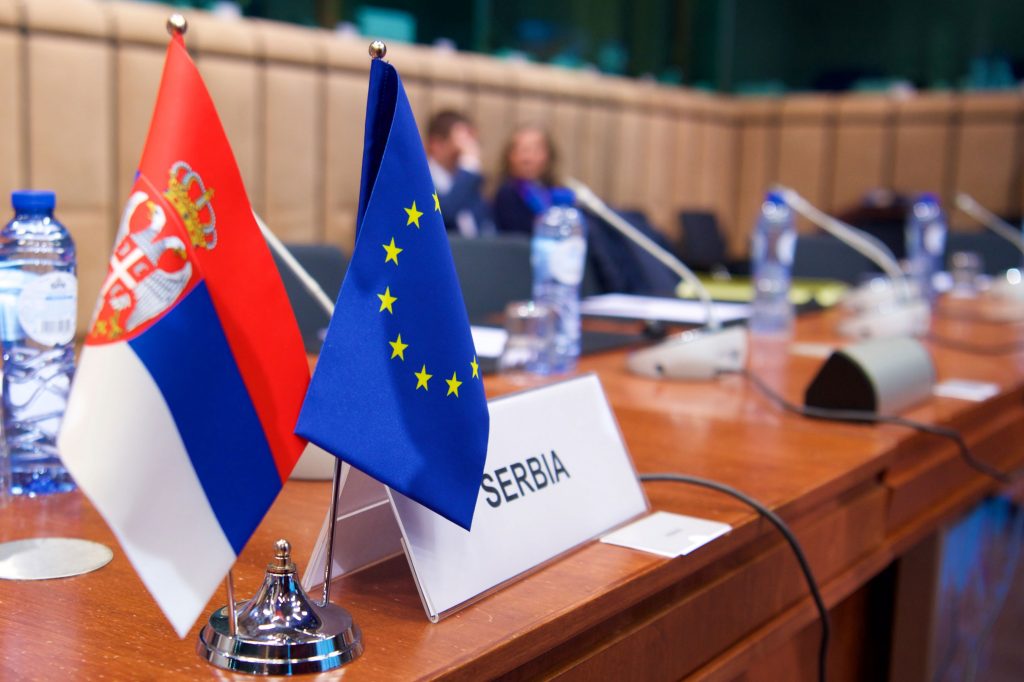Where was Serbia in regards to its European path before 2008?
Then, as now, our desire and readiness for accelerated accession to the European Union were greater than the EU allowed. Even today, we believe that we deserve to be much closer to full membership than our formal status in the negotiations show. Since the 2003 Thessaloniki Summit, where the EU committed itself to accept the Balkan states into its membership, Serbia has been facing many political conditions all the time, the fulfillment of which is required in order to move up a few steps towards membership. In the past, for example, it was the regulation of relations with Montenegro, then the extradition of the remaining indictees to the Hague Tribunal, and the always-current issue of Kosovo and Metohija. The political conditioning of our membership in the EU is a constant on our European path. It is the same today when it comes to Kosovo and Metohija. However, we accept this and try to find a solution, regardless of whether the conditioning is fair or not. Accession to the European Union is a strategic goal of Serbia and we will achieve it, sooner or later. It is better for both Serbia and the EU to do it sooner rather than later, but we cannot influence the behavior of the EU, and the speed of our accession depends on it. It is always a political decision.
Where does Serbia currently stand and what are the challenges on the path to EU?
Regarding formal accession negotiations, we have opened 18 out of 35 negotiation chapters. A few days ago, on June 22, 2021, an Intergovernmental Conference was held in Luxembourg, at which a new methodology of negotiations was formally presented and we are now continuing negotiations according to this new model. We are ready to open two clusters and we hope that this will be realized during the presidency of Slovenia by the end of this year. We think we have done a much better job than what can be seen from the formal result. We have always gone faster than the EU wanted to accept. Even when we applied for full membership in 2009, many warned us that we should not do that and we waited for the status of a candidate for the next two and a half years. In general, our work on adjusting to EU standards is constant. It includes all levels from municipalities to the Government and ministries, because membership is our common, strategic goal. Serbia is changing and constantly adjusting to the EU’s criteria because it is good for us to have a more efficient economy, more organized and stronger institutions. Whether this will end up with results in the negotiations with the EU does not depend only on us. Our European path has often been slowed down due to problems within the EU itself. Sometimes it is the migrant crisis, sometimes Brexit, then the elections for the European Parliament, or disagreements among influential members. Anyway, Serbia could make progress towards the EU much faster, but that is often prevented by frequent obstacles and delays set by the other side.

What is the future of Serbia on the EU path?
If the criteria was only in the negotiating of chapters and fulfilling the membership conditions that were valid in every previous round of EU enlargement, I would be very optimistic that Serbia could come to the EU’s door very shortly. Unfortunately, that is not the case because EU enlargement is primarily a political decision by the EU’s members. As you know, one of our negotiating chapters, the last one, called “Other issues”. This is, in fact, the main political condition and it concerns Kosovo and Metohija. No new EU member has had such a political chapter so far, but that’s fine. We have been conducting a dialogue with Pristina for almost 10 years under the auspices of the EU and we are looking for a solution for Kosovo and Metohija which would be the result of a compromise and would bring long-term peace and stability. Sometimes it seems to me that only Serbia cares about that dialogue and its success. We have never interrupted or postponed it. This was done by the other side. The dialogue never stopped because of us, but often because of the EU.
How to balance Serbia’s current foreign policy with the EU’s foreign policy?
Our foreign policy is already harmonized with the EU policy to a great extent. I know this well because I was also the Minister of Foreign Affairs for six years. Nevertheless, there are some issues where our policy cannot match, for example, regarding sanctions against Russia. Serbia is a sovereign country. It is still not a member of the EU and has its own interests in regards to Russia, which is a great trading partner, but also a friend. From the beginning, we have considered European sanctions against Russia to be a wrong decision and which will not have an effect and cannot be consistently implemented. Every EU member, starting with Germany, in some way violates the sanctions against Russia. That is not a consistent policy.
Why is Serbia important for the EU and vice versa?
I am primarily interested in why the European Union is important to Serbia and why we should become a member of the EU. In essence, Serbia has been a part of it for a long time. If we look at the most important aspect of integration, it has to do with the economy. The EU is without a doubt our biggest economic, trade and investment partner. About two thirds of our economy is related to the markets of the European Union. By far, the largest investors in Serbia are from European countries. We are, therefore, fully integrated into European production and supply chains and this makes us an integral part of the European economic area. That would not be the case if there were no mutual interests. That is also why the European Union needs Serbia. On the other hand, Serbia is the largest and most influential country in the Western Balkans, the only remaining region of Europe that has not yet been integrated into the EU, so our positive impact on stability and progress in the region is crucial. I am not the only one who is saying this, the highest-level European and world officials are also saying this. Therefore, when it comes to the enlargement process – which is historically the greatest achievement of the European Union – unfinished business remains; and that is the integration of the Western Balkans.

How to face the challenges in regional politics and how to strengthen relations with neighboring countries?
Relations with our neighbors are, along with the EU, one of our foreign policy priorities, and we pay great attention to that. Serbia is the largest country in the region and has by far the strongest economy, but we do not believe that this gives us the right to put pressure on someone or to abuse that position in any way. On the contrary. We see this as our obligation to make relations in the region as open as possible so everyone could benefit from that openness. All our surrounding neighbors are committed to the EU, but that process has been going on for too long and year after year people are losing faith that this will ever happen. We have, therefore, offered various initiatives to strengthen our ties in the wake of the EU and to remove all barriers that slow
down our trade and movement of people. President Vucic’s initiative on the so-called “Mini Schengen”, which was immediately accepted by Albania and Northern Macedonia, is in fact a European model of open markets and borders that we want to establish in the Balkans. We want to do everything we can even before we enter the EU. We do not have to just wait for that moment, there are many things we can do on our own. Particularly, to help combat the pandemic, when support is not coming from other sides, including from the European Union.
What about Kosovo and Metohija?
We want to find a solution. We do not want the issue of Kosovo and Metohija to remain under the status quo. For as long as there is no solution, the Serbian community in Kosovo and Metohija lives in fear for its safety and the security of its property, which is unsustainable. Both our churches and monasteries are under constant pressure from the Albanians. Incidents are frequent, from the usurpation of church property to the damage of churches and cemeteries. We want that to stop. That is why we have been patient and constructive in the dialogue we are conducting, under the auspices of the EU, for an entire decade. However, I am not sure that everyone in this circle wants a solution to be found. For example, why has Pristina not fulfilled the only obligation it has undertaken for eight years, to form the Community of Serbian Municipalities? I do not believe the EU, the US and others are so powerless that they cannot influence the fulfillment of this only obligation. Nevertheless, we are persistent and patient, we are not giving up the dialogue and we are not leaving the negotiating table, because we know that this is the only way to reach a solution. We understand the solution cannot be ideal for both sides, but it should give us space to build a future in peace, without attacks and fear for safety.
 UK PoliticsWorld PoliticsVideosPrivacy PolicyTerms And Conditions
UK PoliticsWorld PoliticsVideosPrivacy PolicyTerms And Conditions
